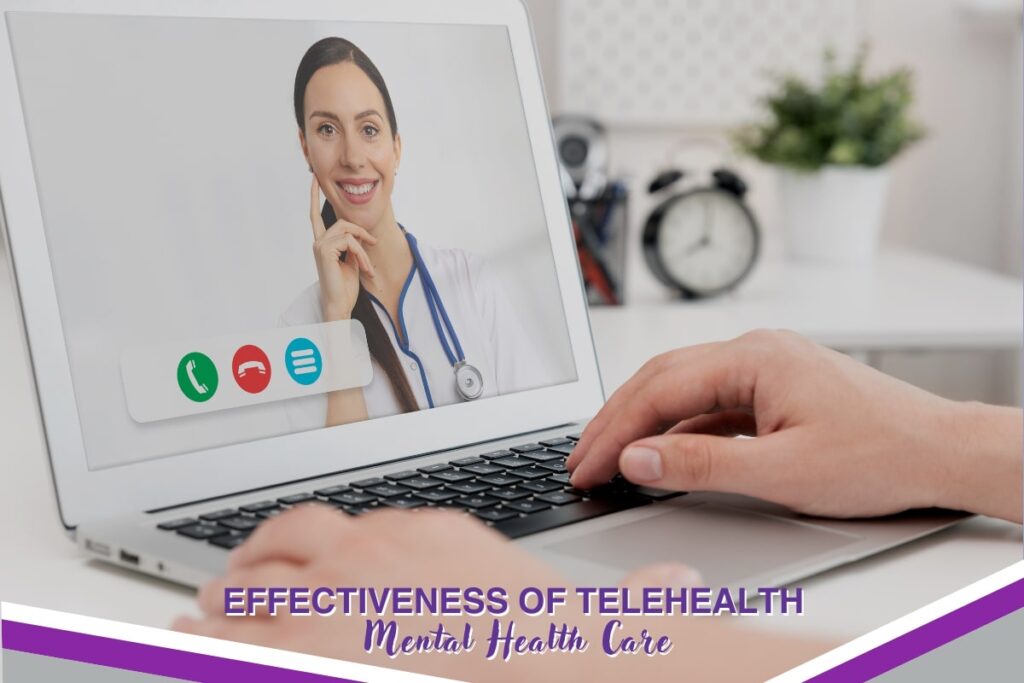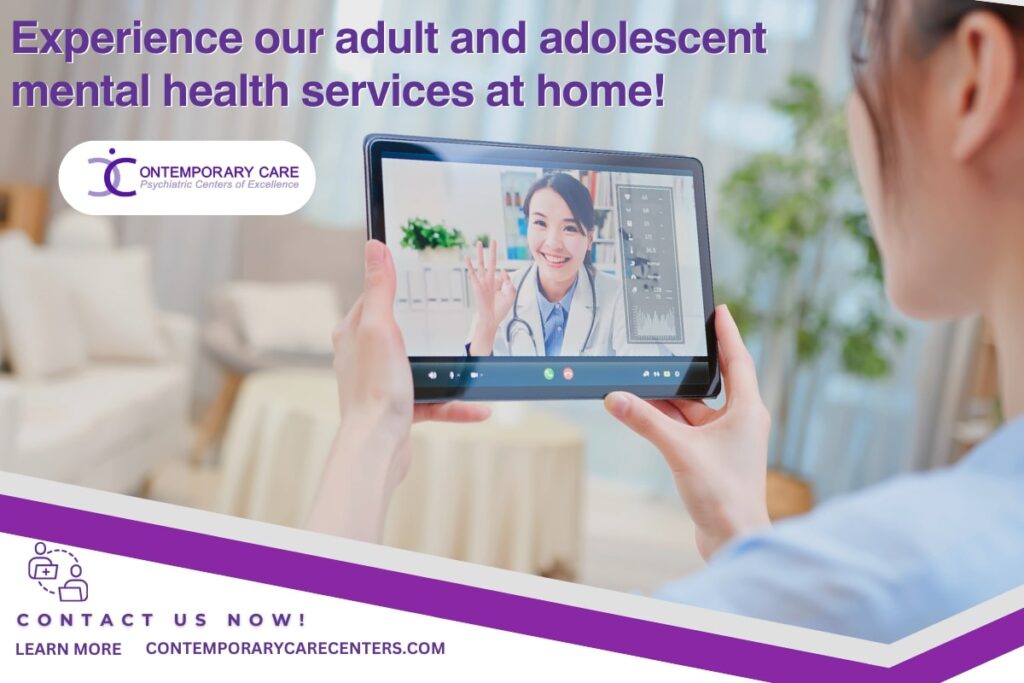In recent years, telehealth mental health services have become increasingly popular, especially with the rise of the COVID-19 pandemic, which necessitated social distancing and remote interactions. Telehealth services have become essential in meeting the mental health needs of individuals, particularly during the COVID-19 pandemic. We can ask this question: Are they too effective, or do you need them? This blog post extensively discusses telehealth mental health care, including its advantages, disadvantages, and proven effectiveness. This in-depth guide will provide information that could be useful whether you are researching telehealth mental health services for yourself or someone close to you.
The Rise of Telehealth Mental Health Services
Telehealth services for mental health aren’t exactly new. Similar to telehealth, it has existed for decades, but more advanced technology and excellent Internet utility have underpinned its expansion. It began predominantly in rural areas, where access to mental health care providers was scarce. Today, it offers everything from video consultations and phone appointments to text-based therapy.
The Impact of COVID-19
The COVID-19 pandemic was a game-changer for telehealth services for mental health. With lockdowns and social distancing measures in place, traditional face-to-face therapy sessions became impractical, if not impossible. As it turned out, this solution would come in Telehealth for an increasingly vital role during one of humanity’s most painful sociorelational epidemics. Telehealth utilization and adoption boomed, leading the way for a broader perspective on what might be possible with remote mental health services.
Benefits of Telehealth Mental Health Services
Accessibility
It is one of the most outstanding benefits of using telehealth mental health services explicitly designed to help with mental health issues. Of course, there are people in faraway and under-resourced communities who might never be able to get mental health care. Telehealth overcomes this obstacle by providing access to therapists and counselors from anywhere an Internet connection is available. This greater access can help with earlier interventions and improved mental health outcomes. Telehealth can also provide critical access to care for individuals dealing with substance abuse issues.
Convenience
Telehealth services for mental health are incredibly convenient. Patients can save time and mitigate the stress of traveling to a therapist’s office.
Time-saving: No need to commute, which saves valuable time.
Flexible scheduling: It is easier to fit therapy sessions into busy schedules.
Reduced stress: Eliminates the stress of traveling to an appointment.
Cost-Effectiveness
With no need for physical office space, therapists can often offer their services at lower rates. Moreover, patients reduce transportation costs and thus may land better deals with their budget. The price has decreased for some people because many insurance companies cover telehealth for mental health. Telehealth platforms can also prescribe medication, reducing the need for in-person visits and associated costs.
Lower therapy costs: Reduced overhead for therapists can translate into lower fees.
Transportation savings: No need to spend on gas or public transport.
Insurance coverage: Many insurers now cover telehealth, making it more affordable.
Anonymity and Comfort
For some individuals, the anonymity and comfort of receiving therapy from their own homes can be a significant benefit. Engaging in treatment from a familiar and safe environment can enhance the therapeutic process and make individuals more willing to seek help.
Increased privacy: Sessions can be conducted in the privacy of one’s home.
Comfortable environment: Being in a familiar setting can help reduce anxiety.
More accessible to open up: Some people find it easier to discuss their issues at home.
Challenges of Telehealth Services for Mental Health
Technological Barriers
Despite its many benefits, telehealth mental health services are not without challenges. One of the primary barriers is technology. Only some people can access reliable internet or the necessary devices to participate in telehealth sessions. For those who do, technical issues such as poor connectivity or difficulty using technology can disrupt sessions and hinder progress.
Lack of Personal Connection
Some individuals may feel that telehealth services for mental health lack the personal connection of in-person therapy. Body language, subtle facial expressions, and other non-verbal cues can be more complex to detect over video calls, potentially impacting the therapeutic relationship. While many find telehealth an adequate substitute, there are better fits for everyone.
Privacy Concerns
Privacy is another concern with telehealth mental health services. Although most telehealth peer support platforms are secure and privacy regulation-compliant, a data breach or unauthorized access is always possible. Patients should utilize a secure, HIPAA-compliant platform and show all privacy steps (e.g., safe internet connection on private devices).
Limited Scope of Treatment
Teletherapy is helpful because it can be a good fit with some treatments, like cognitive-behavioral therapy (CBT), counseling, etc. However, it may not work as well with treatments that require a physical presence, like some types of group therapy or treatment involving activities. In such cases, in-person sessions may have to complement the nature of telehealth. Additionally, telehealth may be less effective for treating certain substance use disorders that require in-person interventions.
Effectiveness of Telehealth Mental Health Services
Research and Studies
Telehealth mental health services: A scoping review of the use of telephone and web-based interventions for post-traumatic stress disorders Pujol et al. 2021 intervene with a psychological approach; first came to light over twenty years ago. Research and studies have shown that telehealth can provide high-quality care for various mental health conditions, such as depression, anxiety, and PTSD, to name a few. That, for instance, is detailed in a study published by the Journal of Affective Disorders, where telehealth cognitive-behavioral therapy showed equal effectiveness to traditional psychotherapy in treating depression.
Patient Satisfaction
Patient satisfaction with telehealth services for mental health is generally high. Many individuals appreciate the convenience and accessibility of telehealth and report positive experiences with their therapists. Findings from an American Psychiatric Association survey identified that more than 80% of patients were ‘very satisfied’ or extremely satisfied with mental health care received via telephone and video.
Therapist Perspectives
Therapists also report positive experiences with telehealth. Many mental health providers appreciate its flexibility and ability to reach a broader range of patients. However, some therapists note the challenges mentioned earlier, such as technological issues and the potential for a lack of personal connection.
Is Telehealth Mental Health Care Right for You?
Factors to Consider
- Accessibility: Do you have reliable access to the internet and the necessary technology to participate in telehealth sessions?
- Comfort: Are you comfortable using technology for therapy? Can you establish a connection with a therapist through a screen?
- Type of Treatment: Does the needed therapy lend itself well to telehealth?
- Privacy: Can you ensure your privacy during sessions?
Personal Preferences
Some individuals thrive in the telehealth environment, finding it more convenient and less stressful than traditional therapy. Others find value in the interaction (face-to-face) and physical presence that is part of in-person treatment. However, thinking about what you feel comfortable with and enjoy will help determine whether telehealth is a good fit for you.
Trial and Error
Sign up for a few sessions to get more comfortable with the telehealth mental health service. Many therapists provide free consultations or introductory sessions, which can help you get a feel for it and see if telehealth is right for you.
The Future of Telehealth Mental Health Services
Technological Advancements
The future of telehealth mental health services is bright as it is ever-evolving, and advancing technology will only continue to improve care quality and ease of access. Technological advancements continually improve telemental health services, utilizing telecommunications or videoconferencing technology to provide mental health services effectively. Greater access to faster internet networks and software for online mind health checks means that the costs of distance diagnosis are already rapidly becoming a thing of the past, with telehealth showing all signs of delivering improved mental care.
Integration with Traditional Therapy
As telehealth becomes more widely accepted, it’s likely to be integrated more seamlessly with traditional therapy. The best approach is a hybrid model that includes some in-person care and at least a portion via telehealth, offering flexibility and convenience while still allowing face-to-face interaction.
Policy and Regulation
Policymakers and regulators also recognize the value of behavioral health services for mental health, leading to regulations and insurance coverage changes. The conversation changes continue to make telehealth more accessible and economical to a broader range of individuals because methods will need to focus on people instead of simply on each other visuals, further securing its place in psychological medical care ways.
Telehealth Mental Health Services Near Me
For those looking to alleviate their symptoms, telepsychiatry is an essential option for behavioral health care. Telehealth offers several attractive benefits that can be critically important for people who might otherwise struggle to access therapy. However, it’s essential to consider the potential challenges and determine whether telehealth fits your specific needs and preferences.
Telehealth is increasingly being used in healthcare for mental wellness, and as technology advances, it will likely continue to grow within the mental health services administration. If you are informed and open, this will help you act in a way that benefits your mental health. Whether you opt for telehealth, traditional therapy, or a mix, the best part is getting your help and working towards feeling better.
Experience Compassionate, Cutting-Edge Care at Contemporary Care Centers
Are you looking for unparalleled mental health care tailored to your wants and lifestyle? Welcome to Contemporary Care Centers, where we care for your well-being and will keep you safe by offering a full range of telepsychiatry. Experience our adult and adolescent mental health services at home—whether you need support for yourself or someone close to you.
Telehealth Services for Your Convenience
At Contemporary Care, we understand the importance of maintaining your mental health without compromising safety and convenience. With our telehealth services, connect remotely with our team of expert psycho-pharmacologists and experienced psychotherapists. Telehealth enables us to receive individual attention from patients and clinicians in our homes, protecting the mental health you came in.
Specialized In-Person Treatments
While we provide mental health services to suit patients from anywhere at any time, some treatments require on-site visits. In-facility offerings are:
TMS (Transcranial Magnetic Stimulation) Treatments: Offered at our full-service locations, TMS is a cutting-edge treatment for depression and other mental health conditions.
Ketamine Treatments: Available at our locations, ketamine treatments provide rapid relief for treatment-resistant depression.
Medication Management: Our team provides comprehensive medication management to ensure you receive the most effective treatment for your condition. This service includes regular evaluations and adjustments to your medication regimen to optimize efficacy and minimize side effects.
Insurance and Accessibility
We work hard to maintain accessibility across the board. We take most insurance plans, including Medicare, to help you come in for care without stress over money. It’s easy to join our health practice, and our friendly administrative team can answer any questions.
Our Comprehensive Approach
Contemporary Care is not just another mental health practice. We are a Team of versatile go-getters who care for each client’s personal needs in Psychiatry. We understand that every patient is different, and we individualize your treatment accordingly. In addition, we provide several traditional and state-of-the-art treatments, such as biofeedback therapy, group therapies, and Transcranial Magnetic Stimulation (TMS). Every patient benefits from a cross-disciplined team’s collective wisdom and experience, providing leading empathetic care.
Take the first step towards better mental health today. Contact Contemporary Care Centers to schedule your telehealth appointment or learn more about our in-person treatments.





